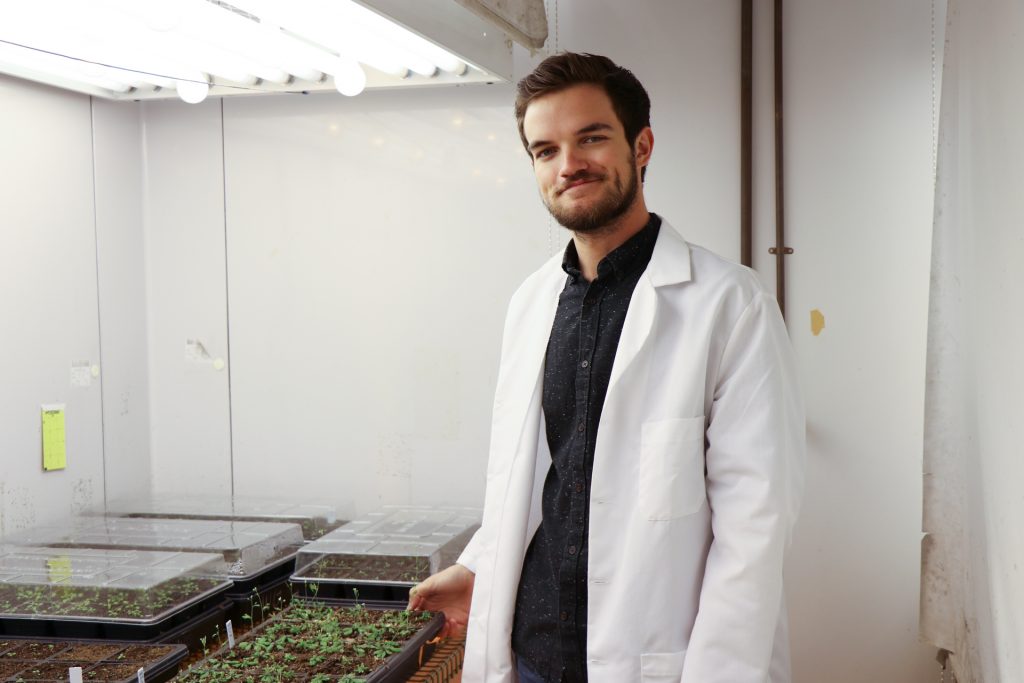Senior biological sciences major Alex McClelland sees a lot more than green leaves when looking at a plant; he sees a living, complex organism with habits and functions similar to those of a human being.

Alex McClelland poses next to Arabidopsis thaliana plants in a growth chamber at the Bond Life Science Center.
McClelland spent part of the past summer working at the Donald Danforth Plant Science Center (DDPSC) in St. Louis, Missouri, where he conducted research focusing on small RNAs with MU Professor and DDPSC Principal Investigator Blake Meyers. Small RNAs are important regulatory molecules in plants, animals and other organisms that play roles in stress responses, pollen development, leaf and flower development, and other aspects of plant biology.
McClelland learned how to construct small RNA libraries, which is a way to capture small RNAs present in plant cells that control the expression of certain genes. The study involves a wide variety of different species, including maize, soybean, rice and other diverse flowering plants, with the aim to improve crop yields by applying the understanding of the functions of small RNAs. McClelland says his construction did not necessarily work, but that he is grateful for the hands-on experience.
“In terms of the research they do (at the Danforth Center) and their facilities, I would definitely be interested in going back there,” McClelland says.
As an upperclassman, McClelland is excited to gain more independence in the lab, both in and outside of school. His current project has been in the works since the beginning of his undergraduate studies. He got his start with research his freshman year at MU, when he joined the Freshman Research In Plant Sciences (FRIPS) program.
The primary goal of FRIPS is to give freshmen the opportunity to get in the lab. McClelland says the program helped him learn how to approach research, gain exposure to the lab and develop his communication skills. According to Plant Sciences Professor Walter Gassmann, introducing biology students to lab work early makes all the difference in developing their skills and interest level with their studies at MU.
“If you’re trying to get new knowledge, you by definition are trying to go somewhere we don’t know yet,” Gassmann says. “The more background you have, the better, but in terms of doing experiments, freshmen can do that just as well as upperclassmen if they acquire the right experimental skills, and that is practice. The sooner you get into a lab, the better.”
Gassmann does lab work with McClelland at Mizzou, where they are currently studying the immune systems of Arabidopsis thaliana, a common model organism for plant sciences. Just as people suffer from allergies or autoimmune diseases, Gassmann says, plants can contract illnesses, too. Their goal is to figure out what is keeping affected, mutant plants from looking like their healthy counterparts.
Though these specific plants hold no agricultural value, the genes identified in this research do very similar things in crops and could apply to a wider range of plants. The starting point for most of this research is genetics. For this project, McClelland is looking at candidate genes and different protein interactors, and figuring out how to control them.
“Ultimately, all life on earth depends on healthy plants,” Gassmann says. “We really need to understand everything about plants so we can be as smart as possible to grow food and keep enough wild area for ecological services. I think plants are more important than anything else. The basis of everything is our plants.”
Both Gassmann and McClelland enjoy working with plants over other organisms because they are easy to interact with, but highly complex. McClelland’s love for plant biology actually stems from a fun fact: that bananas share 50% of human DNA.
“I like biology because it’s kind of this intersection of physics and chemistry, and it’s just all of these sciences combined, and I think that’s really exciting,” McClelland says. “I’ve always had kind of a moral dilemma with working with animals or studying on mice. I just wouldn’t feel right about it, so whenever I learned that plants are just as complex as animals and do a lot of the same stuff we do, it got me excited about biology within plants.”
In addition to the research he’s done with FRIPS and the DDPSC, McClelland taught the Biology Intensive Orientation Mizzou Experience (BIOME) Freshman Interest Group last year. BIOME offers incoming freshmen the opportunity to hone their academic skills through biology and chemistry exams, lab tours, and more.
McClelland’s research is currently funded by the Life Science Undergraduate Research Opportunity Program and is an Undergraduate Research Ambassador with the Office of Undergraduate Research, where he participates in outreach—mostly to freshmen—to provide them the information about how to get involved in undergraduate research across all disciplines.
McClelland wants to continue his studies with plant biology after this year by pursuing his Ph.D. After continuing his research, he would like to teach at the collegiate level.